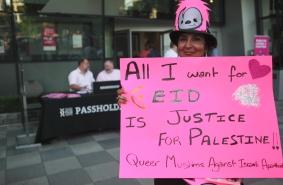About a dozen activists staged a protest to draw attention to so-called “pinkwashing” by Israel’s government at the screening of an Israeli-backed documentary at the Vancouver Queer Film Festival (VQFF) Aug 22.
The documentary, Invisible Men, by gay Israeli director, Yariv Mozer, follows in part the journey of Louie, a gay Palestinian who seeks refuge in Israel after receiving death threats from his own family, only to face harassment and deportation, before eventually fleeing to Europe.
An Aug 21 letter sent by Queers Against Israeli Apartheid (QuAIA) to Out On Screen, and read after the film’s screening, says the documentary “rather than supporting Palestinian queers, replaces their voice with an Israeli narrative, funded and supported by the very government engaged in a military occupation and apartheid structure in Palestine that targets Palestinian queers just as directly as every other Palestinian.”
QuAIA member, Amal Rana, pointed to Mozer’s and the film’s financial ties to the Israeli government as a symbol of “pinkwashing,” a bid to portray Israel as gay-friendly while glossing over its human rights record, she said.
QuAIA said they were “disturbed” about the inclusion of the documentary and another Israeli film, Joe + Belle, in the festival.
“As someone from a Jewish and Muslim background, and someone who’s queer, I don’t feel really comfortable going into my own festival,” Rana told Xtra.
“Palestinian queers themselves have said that the first thing we need to tackle is the occupation. They agree that homophobia and transphobia exist everywhere — in Palestine, in Israel, and everywhere else,” she says.
The activists called on Queer Film Festival organizers to adopt a cultural boycott of Israel.
But the Centre for Israel and Jewish Affairs (CIJA) has criticized QuAIA for its boycott demand, saying that Israeli queers deserve an opportunity to celebrate the “extraordinary inroads” the state has made towards equality.
“It’s very telling that QuAIA doesn’t contend the fact that hundreds of gay Palestinians have fled to Israel in order to join Israel’s open and vibrant gay community,” Darren Mackoff, CIJA’s Pacific Region Director told Xtra. “The idea that Israel’s LGBT community, which includes many gay Palestinians, should be subject to a boycott is not just absurd — it’s offensive.
“I’m not sure why we can’t celebrate Israel’s achievements in advancing gay rights without the conversation being reduced to one-dimensional, ‘us-versus-them’ thinking. This is not to say that Israel’s government, like every other democratic government, shouldn’t be subject to fair criticism for particular policy decisions.”
The film festival organizers said they welcomed the post-film discussion.
“We are grateful to those members of the queer communities and our allies who share their feedback about the films we screen,” OOS executive director Drew Dennis and programming director Amber Dawn say in an Aug 22 statement. “Film has the power to inspire discussion and dialogue. We welcome the opportunity to host these conversations during our festival, and year-round.
“Since our founding 24 years ago, we have been proud to be a place of conversation, hosting community-based dialogue panels that encourage divergent viewpoints to be expressed in an environment that embraces diversity and respects differences.”
Festival–goers told Xtra they found the documentary “very disturbing” and “painful,” while another said she worried its deeply intimate approach was “exploitative” of the subjects. Although most attendees Xtra spoke with were inspired by the film, they were divided about QuAIA’s boycott.
“I always welcome new information, so I’m glad I got the chance to hear the letter they presented,” says filmgoer Jim Matteoni. “But I’m even more glad I got a chance to see the film.
“Boycotting and excluding a film like that is a way of putting our own blinders on. That has me a little bit scared. But the public protest about the film — and making us aware that this might be pinkwashing by the government of Israel and cultural associations – is justifiable, and I’m glad it happened… Boy, it’s a tough one; I have to say, I’m still sitting on the fence.”
Another attendee told Xtra he disagrees with the protest, and felt the panel discussion afterwards — featuring the Rainbow Refugee Committee, No One Is Illegal and QuAIA — was dominated by Rana’s reading of QuAIA’s statement.
“I felt generally that what they did was an ad hominem, that the film was sponsored by the Israeli government, and that it was feeding into a colonial mentality,” said Ron Kidd outside the Vancity Theatre, where Invisible Men played. “They grabbed too much attention.
“The whole situation is very painful. I’ve been in the Occupied Territories, and I’ve seen how brutal the Occupation is. But I don’t believe in cutting off free speech either.”
The activists’ statement acknowledged the film’s claim to be “socially conscious,” and director Mozer’s portrayal of the discrimination faced by Palestinian refugees in Israel.
In San Francisco, activists disrupted a screening of Invisible Men at the LGBT International Film Festival in July, an action that was both applauded and jeered by the audience.
A Mondoweiss report noted that the film’s director, Mozer, who attended that screening, challenged activists about the value of a cultural boycott.
In 2009, the Toronto International Film Festival also became mired in controversy even before it began, when it faced criticism for its City to City showcase on Tel Aviv.

 Why you can trust Xtra
Why you can trust Xtra


